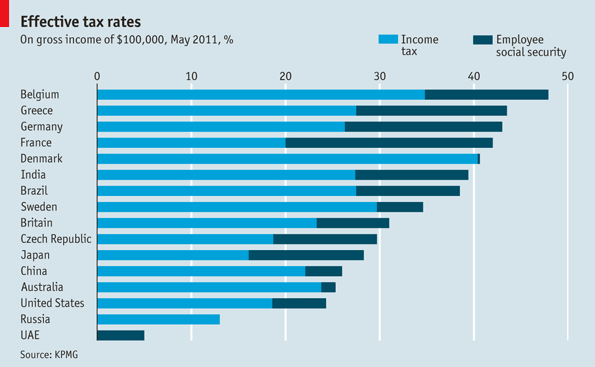Effective tax rates
Brazilian government takes 40% from a $100,000 salary?
BRAZIL has a income tax of 27.5% for a person earning $100,000, according to a survey of effective tax rates in 93 countries published on September 29th by KPMG, an accounting firm. But employee social-security contributions in Brazil are 12%, and once such contributions are taken into account, high earners in Brazil will take home 62% of their salary. Brazilian high earners will still take home more than several countries, including Belgium, Greece, Germany and France. Belgium’s government grabs the highest share from earnings of $100,000, at almost 48%.
Incomes in Brazil
Brazilian income tax rate bracket of 27,5% starts at salaries above R$ 3911,63. With inflation at almost 7% one can expect salaries will increase next year, pushing more tax payers in the higher bracket. The unions are propping up for higher salaries. At the moment the government owned banks are striking, in several states teachers and police are striking for better working conditions and higher salaries. A significant shortage of qualified and skilled labour force and high demand as a result of the relative strong economy and implemented government (protectionism) programs will push salaries further.
Just a few years ago salaries of R$ were very exceptional, but a recent survey of DataFolha shows that more and more categories have moved in to this salary scale over the last couple of years.
The good news is that more taxes income is available for the government to implement the much need infrastructure, social and education programs. The challenge is the execution power of the various governmental powers to implement the plans in budget and on time. The real bad news is that higher salaries are pushing inflation. Not only will the cost of production increase, but also consumer demand will increase. In the overheated economy (some already signaling a bubble) producers will be able to raise prices of their products. In a few critical branches of the economy this is further supported by the government to frustrate foreign direct investment. The clearest example is the recent increase by 30% of the import taxes on cars not produced in Brazil. With the major economies in the world suffering, one might ask himself whether Brazil will escape a financial crises.


